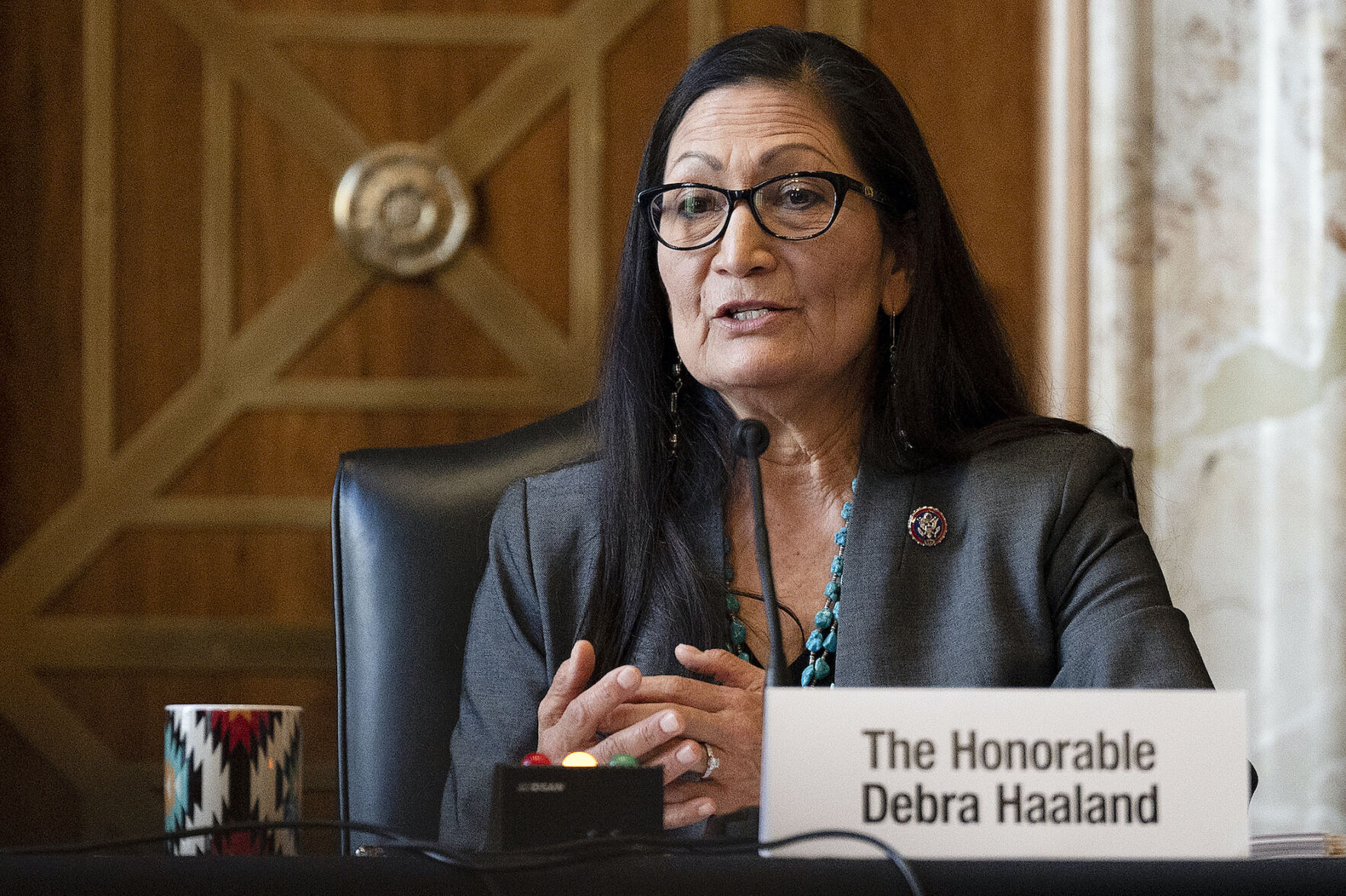OUT WEST ROUNDUP | Special election set to replace Haaland; I-80 tolling bill advances

NEW MEXICO
Vote set for June 1 to fill Haaland’s congressional seat
WASHINGTON — The New Mexico secretary of state on March 17 ordered a June 1 special election to replace former Rep. Deb Haaland, who resigned her 1st District seat after being confirmed as interior secretary.
The district is considered safely Democratic, with Haaland winning reelection by 17 points in November as Democratic nominee Joe Biden beat President Donald Trump by 23 points.
The real action in the election could come in the next couple weeks, as roughly 200 state party central committee members will pick a Democratic nominee on March 30. Already, eight Democrats have announced campaigns, including four members of the state Legislature, a trial attorney who is the widow of a former state supreme court justice, a top aide to the governor and two community activists.
RELATED:
Senate confirms New Mexico’s Deb Haaland as interior secretary
Hickenlooper tells interior nominee from New Mexico: Keep BLM in Grand Junction
The state Republican Party has not announced the date it will select its nominee. Under state law, its results must be certified by April 6.
The Democratic candidates include:
State Sen. Antoinette Sedillo Lopez who ran against Haaland in the 2018 primary; state Rep. Melanie Stansbury, a former Hill staffer who worked in President Barack Obama’s Office of Management and Budget; state Rep. Georgene Louis, an attorney and member of the Acoma tribe; state Rep. Patricia Roybal Caballero, a longtime public administrator and community and economic developer who is also active in national Latino civil rights and advocacy groups; Randi McGinn, a trial attorney who is the widow of former New Mexico state supreme court chief justice Charles Daniels; Victor Reyes, a top aide to Gov. Michelle Lujan Grisham; Selinda Guerrero, Movement for Black Lives organizer; and Francisco Fernández, an LGBTQ advocate who would be the first member of Congress who is HIV-positive.
2020 marks increase for state’s hot pepper production
ALBUQUERQUE — For chiles, 2020 wasn’t all bad as New Mexico farmers reported increased production and yield levels for the state’s most famous crop despite pressures related to the coronavirus pandemic.
Numbers released March 4 by the U.S. Agriculture Department’s statistics service show 68,000 tons of red and green chile were produced last year. That’s an 8% increase over the previous year. The value of the crop also increased to nearly $52 million.
“Chile today and hot tamale! That’s the weather forecast,” joked Jeff Witte, head of the New Mexico Agriculture Department.
RELATED:
Chile battle gets hot between Polis, New Mexico governor
Hickenlooper signs Esgar-Garcia bill creating specialty license plate to recognize Pueblo chile
He said the positive numbers are a tribute to New Mexico’s farmers, who weathered labor shortages and reduced demand as restaurants and other venues were forced to close. He pointed to the ripple effects of the industry beyond the farm, saying that the crop forms the basis of salsas, sauces and other mainstream products.
The 2020 crop was helped by a mild growing season that was warm and dry — just what chile plants like.
Joram Robbs, executive director of the New Mexico Chile Association, said the tonnage and yield increases can be attributed to technological advancements that include better genetics.
But there are still challenges on the horizon, including decreased demand as the restaurant industry has yet to recover. Robbs said some processors and distributors have reported up to a 40% decrease in sales that normally would have been sold to restaurants.
WYOMING
I-80 tolling bill gains initial lawmaker support
CHEYENNE — A bill that would set in motion a long-term plan to set up a tolling program for Interstate 80 gained initial approval from the Wyoming Senate on March 18, as lawmakers search for ways to remedy a funding deficit for the state’s roads and bridges.
Senate File 73, which still needs to gain two more votes of support from the body before it could go to the House, would authorize a master plan for I-80 to be developed by the Wyoming Department of Transportation, which faces annually unmet needs totaling more than $300 million, according to a recent report.
RELATED:
OPINION | The time to act on transportation is now
INSIGHTS | The road ahead on transportation is one less taken
The bill’s main sponsor, Sen. Cale Case, R-Lander, noted that the state’s traditional revenues used for roads, specifically from fuel and severance taxes, have diminished significantly in recent years.
Although not contained in the bill, Case cited Wyoming Department of Transportation scenarios, under which commercial trucks would be charged 25 cents per mile driven, while passenger vehicles would have to pay 2.5 cents per mile. He also floated the idea of providing a free allowance for a certain number of miles travelled along I-80 per day for every driver, as an effort to avoid having much impact on local commuters.
A few lawmakers raised concerns over the tolling legislation, including whether it would be allowed by the Wyoming Constitution and how it would impact local versus out-of-state drivers.
ARIZONA
Officials seek information on death of endangered gray wolf
EAGAR — The U.S. Fish and Wildlife Service is investigating what it says is a suspicious death of an endangered Mexican gray wolf near Eagar.
The agency and others are offering a reward of up to $37,000 for information that leads to a conviction.
Federal law enforcement officers removed the carcass from the Apache-Sitgreaves National Forest on Feb. 19, a day after they say a vehicle was seen stopped or driving slowly near the Saffel Canyon trailhead.
The wolf was part of the Hoodoo pack that was hazed away from Nutrioso in December, according to the Fish and Wildlife Service.
RELATED:
CPW places tracking collar on wolf in northern Colorado
Colorado Parks and Wildlife commission votes to create wolf management plan
Reintroduction of Mexican wolves to the American Southwest began more than two decades ago. The results of the latest annual survey show there are at least 186 wolves in the wild in New Mexico and Arizona, a figure that has increased for five consecutive years.
Still, environmentalists have said that high rates of illegal killings continue to slow recovery efforts. At least 105 wolves have died illegally from shootings, trappings and other methods between 1998 and 2019, according to the Fish and Wildlife Service, representing 57% of all deaths.
Killing a Mexican gray wolf violates state and federal laws. Its punishable by up to a year in jail and thousands of dollars in fines upon conviction.
MONTANA
Lawmakers revisit dress code some call sexist
HELENA — Montana lawmakers have revived a dress code that drew accusations of sexism when it was first introduced ahead of the 2015 legislative session before being tabled without ever taking effect.
The dress code made a reappearance March 18 in response to a Republican lawmaker’s objection to a male Democrat’s decision not to wear a tie on the House floor, part of an unwritten expectation loosely enforced by lawmakers.
Lawmakers in the GOP-controlled legislature were originally scheduled to discuss the dress code on March 19, but the hearing was rescheduled for sometime the next week.
Republicans said they wanted to cement the tie-wearing expectation in House rules, but by making an issue of requiring ties for men they also brought back what some feel are sexist requirements for women.
The proposed code says women “should be sensitive to skirt lengths and necklines” while saying they can wear suits or dresses.
Democratic lawmakers expressed anger during a House Rules Committee meeting when Republican lawmakers first brought up the issue, pointing out that legislators should focus on addressing the impacts of the coronavirus pandemic on the state.
Montana lawmakers drew national attention and plenty of mocking when the dress code came up in 2014.













